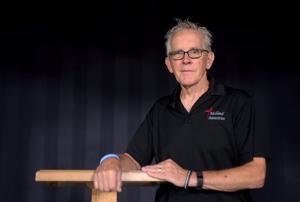Posted: Saturday, August 29, 2015 6:00 am
Several decades after being released from an Oregon prison, the Rev. Jack Hager continues to return to prison several times a week — this time, to minister to offenders as a volunteer prison chaplain.
The Rev. Hager has worked in prison ministry for several decades, spurred by his own experience with incarceration in the 1970s. Now, he focuses on fulfilling the needs of offenders at the Western Reception, Diagnostic and Correctional Center in St. Joseph and Crossroads Correctional Center in Cameron, Mo., several times a week for the last seven years.
“Basically, I think ministry is ministry,” the Rev. Hager says. “You love God and you love people, whether it is a teenager or a convicted murder or a sex offender. Other than the fact that they are confined, it’s really not any different than any other kind of ministry.”
Finding God
After serving in Vietnam, he eventually became a “stereotypical child of the ’60s,” the Rev. Hager says, experimenting with drugs and crime.
“I got busted in Texas on fugitive charges,” he says. “They threw me in a jail cell. A few days later, they found some drugs in the cell, which isn’t terribly unusual. They took everything out except the religious things.”
At 26 years old and “reasonably well educated,” he had never been to church except for weddings and funerals, the Rev. Hager says.
“I’d always believed in God or a higher power or something, but I had no clue what Jesus Christ claimed to be,” he says. “I got bored and read a book that introduced me to the Bible, then I read the Bible for a while. After that, the light went off and I trusted Christ.”
Unlike many people’s journeys to Christ, the Rev. Hager says, his was taken alone.
“It’s unique in the sense that there was no human being directly involved,” he says. “It was just the word of God.”
After he finished his four years in prison, he was released and eventually attended religious training in Kansas City. As an ordained minister, he has planted a church in New York, served as an interim pastor for several churches and works for various ministries including Midland Ministries in St. Joseph. He now also gives presentations about his experiences in prison, ministry and military service.
As a volunteer prison chaplain, he attends Bible studies and speaks at the prison chapel. He is also available for one-on-one meetings with offenders.
“There are some people who think ‘if I just come to Jesus, they will be OK,’” the Rev. Hager says. “But that’s not true. Some sins are legal. Some sins are illegal. If a guy’s got a heavy meth habit, although my goal is to introduce them to the Gospel of Jesus Christ, it’s not some simple way of saying ‘now you are going to be a good guy for the rest of your life.’ “
Taking personal responsibility for actions is key to being successful, the Rev. Hager says.
“With or without Christ, until a guy mans up and says ‘I blew it,’ he can’t change,” the Rev. Hager says. “I’m real big on personal responsibility. Coming to Jesus Christ doesn’t make everything all right for anybody. It does long term, but short term, you’ve still got to make your choices.”
His experience in the correctional system is a testament to the fact that it is possible to remain out of prison after being released, the Rev. Hager says.
“I think it helps in some sense,” he says. “It gives me credibility to guys. Whether or not they buy into my faith, I’ve been out since 1977 and I’m making it.”
Misconceptions
The biggest challenge comes when offenders are released and can face more temptations, the Rev. Hager says.
“Some of these guys, they hit the gate and they aren’t supposed to associate with someone who’s got a record. But mom’s got a record. Dad’s got a record ... It’s really really tough,” he says. “I think anyone can make it on the street if they’ve got the want to, but it’s really really difficult.”
He encourages the men to get involved with a church, if possible, after their release, and encourages churches to be open and accepting.
“I tell churches not to patronize the guys,” he says. “They aren’t your token ex-convicts. They are just the guy who happened to be incarcerated for a while. Treat him just like a brother.”
He hopes that more people will be interested in working in prison ministry in the future, but acknowledges that it isn’t right for everyone.
“It’s not for everyone,” he says. “I don’t like going to nursing homes. Some people don’t like going to the prisons. And that’s OK. But I’d recommend they try it sometime.”
In the end, it is a rewarding volunteer role, the Rev. Hager says.
“It’s seeing a guy come to the faith, number one, that’s rewarding,” he says. “And it’s seeing a guy with that glimmer of hope that ‘yes, I can make it.’ “
Jena Sauber can be reached at jena.sauber@newspressnow.com. Follow her on Twitter: @SJNPSauber.




